
- SAP Community
- Products and Technology
- Enterprise Resource Planning
- ERP Blogs by SAP
- Configuring Features and Personas in SAP Service a...
- Subscribe to RSS Feed
- Mark as New
- Mark as Read
- Bookmark
- Subscribe
- Printer Friendly Page
- Report Inappropriate Content
Table of Contents
- Supported scenarios
- Usage Types
- User assignments
- Feature assignments
- Performance calibration
- Fine-tuned calibration
- Additional details
Supported scenarios
SAP Service and Asset Manager is delivered with four personas — Maintenance Technician, Field Service Technician, Inventory Clerk, and Safety Technician. The mobile application will load a different start page based on the persona assignment.
By default, all personas are available in the Mobile Application Integration Framework Configuration, a.k.a., the config panel, with
MAINTENANCE_TECHNICIAN set as the default.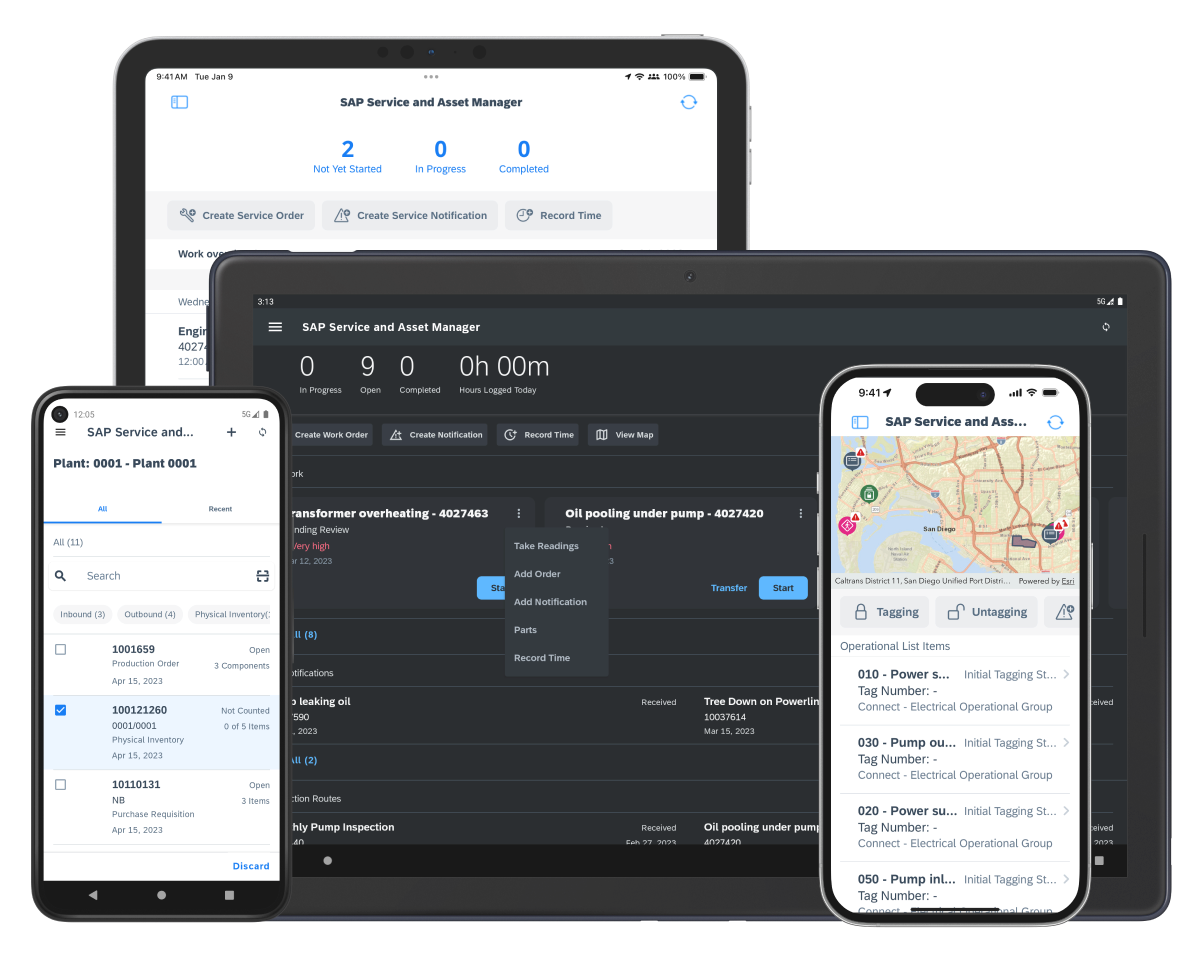
SAP Service and Asset Manager start screens for Field Service Technician, Maintenance Technician, Inventory Clerk, and Safety Technician personas
Usage Types
Each persona is categorized by usage type, either Professional or Standard user. This determines the Full Use Equivalent (FUE) valuation according to the updated licensing model for SAP Service and Asset Manager.
Professional usage type is one (1) FUE and Standard is one-half (1/2) FUE. In the base configuration, Maintenance Technician is considered Professional, with Field Service Technician and Inventory Clerk considered Standard. Customers may also define a custom persona which is considered an Professional usage type.
It is important to note that the usage type is not necessarily specific to a persona, but rather the feature sets available. For example, a single FUE is the maximum value for any single user which allows access to all available features, meaning the Professional Use type is configured with more feature support than the Standard User usage type. More on this later.
The key difference is when a customer is using a standard Mobile Application Integration Framework (MAIF) application, e.g., SAP Service and Asset Manager, and only needs inventory or field service functionality. In this case, one (1) FUE could cover two users since those personas are Standard Use with only one-half (1/2) FUE value.
The following table depicts what usage type can be configured for different application types:
| Application Type | Persona Type | Usage Type | Changeability |
| MAIF application | Maintenance Technician | Professional | No change allowed in customer system Changes allowed in SAP development system only |
| Safety Technician | Professional | ||
| Field Service Technician | Standard | ||
| Inventory Clerk | Standard | ||
| Partner-defined MAIF application | Persona I | Professional | Can only be changed in partner development system |
| Persona II | Standard | ||
| Persona III | Standard | ||
| Custom | Professional | Change allowed in customer system Custom persona can be created in customer namespace only | |
| Custom-defined MAIF application | Custom | Professional | Change allowed in customer system Custom persona can be created in customer namespace only |
User assignments
SAP Service and Asset Manager allows a single user to be assigned multiple personas, and she may switch between them in the Profile Settings screen of the mobile application.
Let’s look at the ways personas are assigned to a user.
Determination logic
The system determines persona based on the following logic and sequence.
System Administration & Monitoring Portal
Users may be assigned to one or more personas in the admin portal, launched in SAP GUI with tcode /n/syclo/admin. This is first considered to determine a user’s persona. If a persona is assigned here, we will not do further checks.
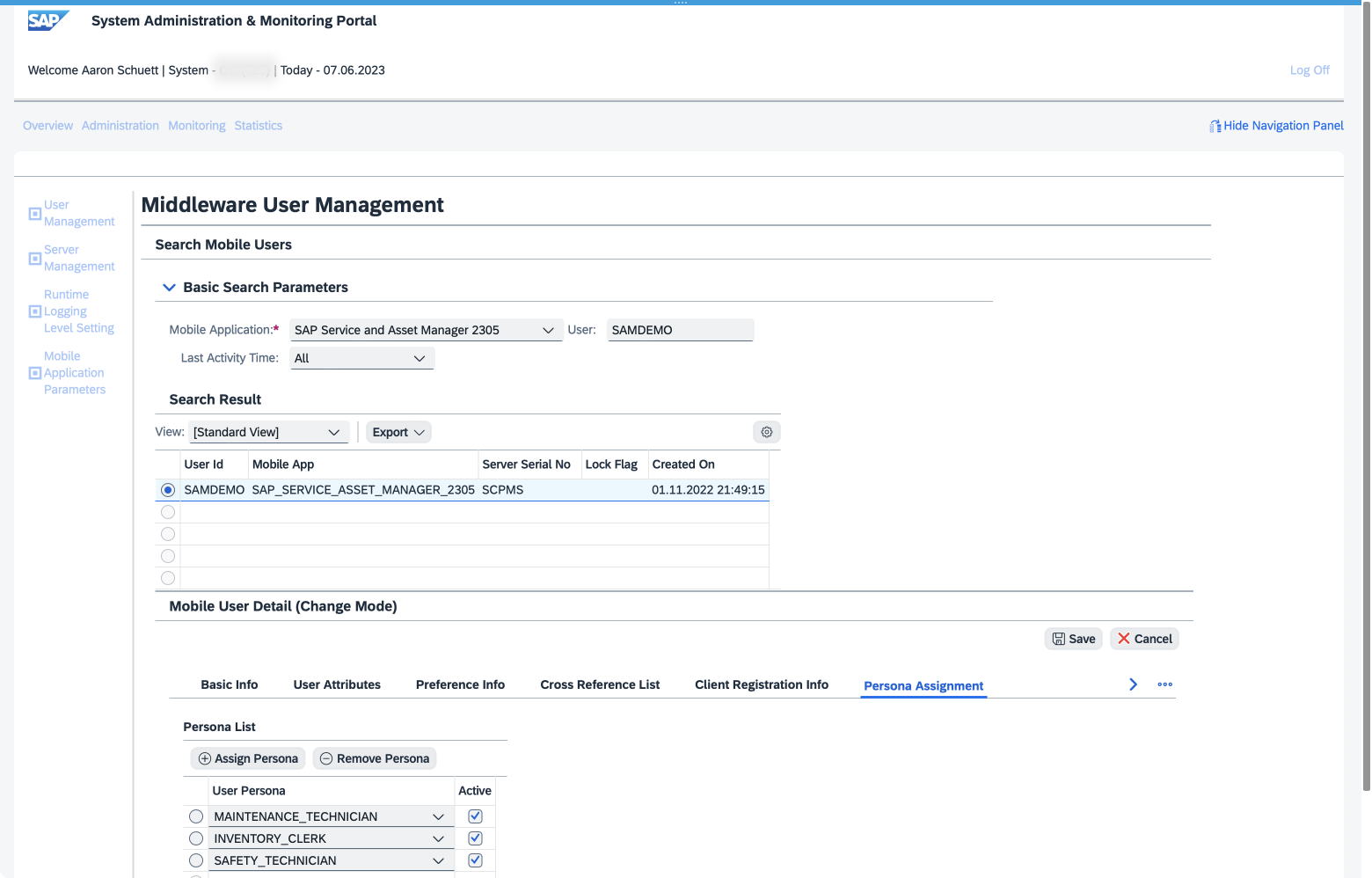
System Administration and Monitoring Portal / User Assignment / Persona Assignment
Authorization objects or roles
If no assignment is found in the admin portal, the system will check authorization objects.
Each persona is associated with a pre-defined authorization object in SAP Service and Asset Manager. Customers may assign the pre-defined authorization objects to users as needed. The authorization objects are then used to determine the user persona.
These are typically assigned to a role in SAP GUI via t-code
PFCG. By default, three standard authorization objects are delivered:| Persona | Authorization Object |
| Maintenance Technician | /MERP/SMT |
| Field Service Technician | /MERP/FST |
| Inventory Clerk | /MERP/SIC |
| Safety Technician | /MERP/WCM |
Customers need to create custom role(s) and assigned authorization object(s) accordingly based on their own business and security needs.

Default persona
Lastly, if neither of the above are found, the system will use the default persona. There must be a default persona configured; Maintenance Technician is the default in standard delivery.
Customers may update the default persona based on their business needs by selecting the default checkbox in config panel, launched in SAP GUI with tcode
/n/SYCLO/CONFIGPANEL.
Mobile Application Integration Framework Configuration / Mobile Application Configuration / SAP_SERVICE_ASSET_MANAGER_[VERSION] / Application Persona
Feature assignments
Customers may turn off a feature if it is not relevant in their business scenario, regardless of the personas in use. There are two ways to do this.
Application level
The list of features delivered in SAP Service and Asset Manager are shown in the config panel. Customers may define new features in a customer namespace only.
Each feature has an Active check mark that can be toggled. This acts as the master switch across the application. Some features such as Supervisor Mode and Crew Management are disabled by default and need to be enabled if you are using this functionality.
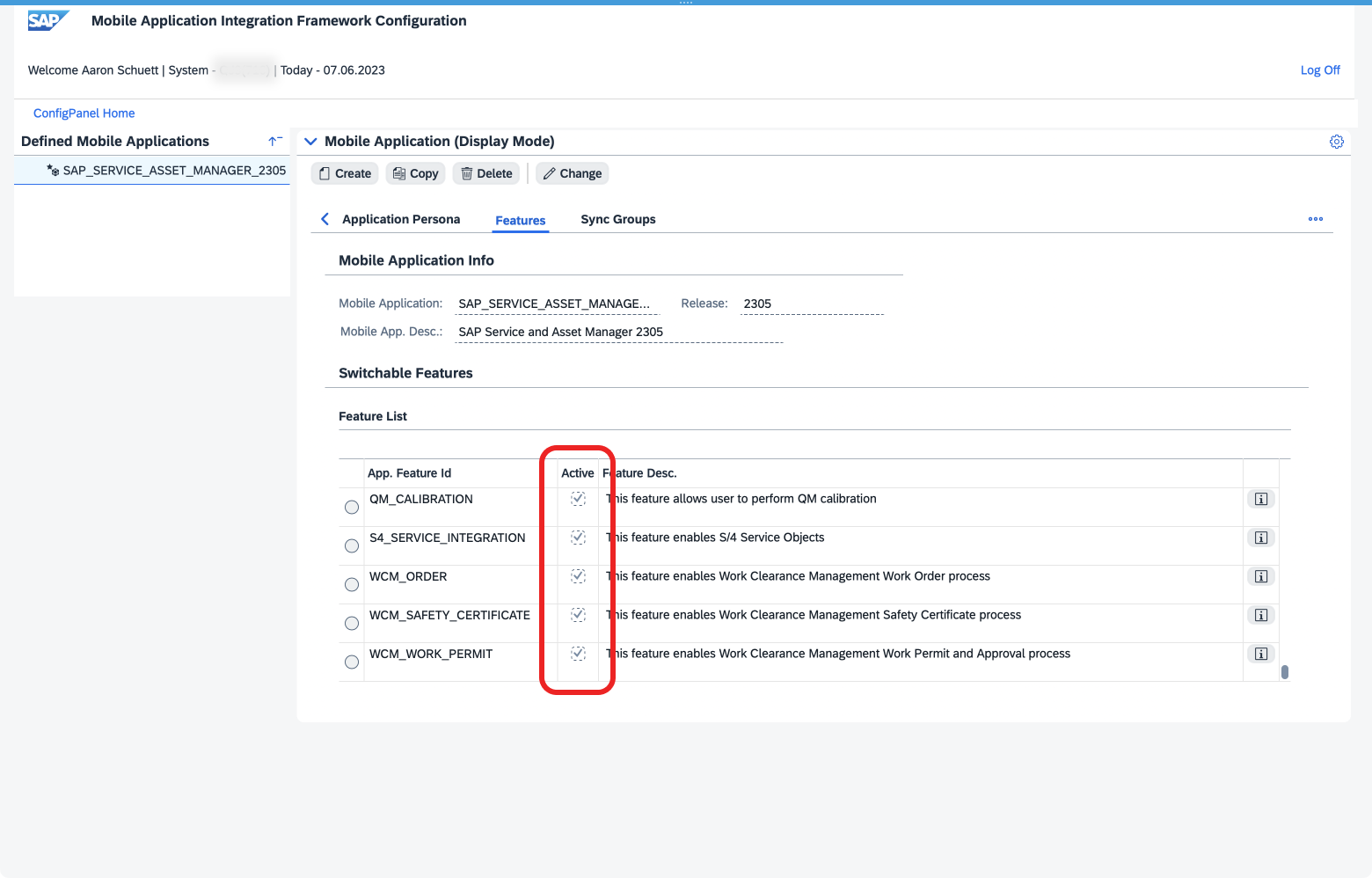
Mobile Application Integration Framework Configuration / Mobile Application Configuration / SAP_SERVICE_ASSET_MANAGER_[VERSION] / Features
Note that enabling a feature does mean that the customer system is qualified for the feature or no. For example, if your system does not support SAP IS-U Meter Management, but you enable
ISU_METER_MANAGEMENT in the feature list, you may see errors on the backend.Persona level
You may also toggle features related to a persona. Each persona is configured with a list of features supported in the standard delivery of SAP Service and Asset Manager.
You may view a list of features by persona in the config panel. Each feature has an In-Scope checkbox meaning that feature is allowed for that persona. In-scope features are not editable in customer or QA environments. Only in-scope items can be enabled/disabled using the Active Flag checkbox.

Mobile Application Integration Framework Configuration / Component Assignments / SAP_SERVICE_ASSET_MANAGER_[VERSION] / User Personas
It is possible to enable a feature in one persona but disable the same feature in another persona. The list can be filtered using the User Persona or Application Feature Id dropdown to find the entries directly.
Note that if the feature is disabled at the application level — the master switch — the feature is still considered disabled regardless of the Active Flag status at the persona level.
Performance calibration
During mobile client synchronization, all active data objects are sent to the mobile user. This can lead to increased sync times if data is being sent to the mobile user that is not needed by the client application.
It is important to disable the data objects that are not used in your workflow. There are several ways to accomplish this.
oMDO Assignment
Each feature is associated with one or more oData Mobile Data Object (oMDO) which provides business logic for a business object used in the mobile application and is mapped to OData requests for a business object on the backend.
You may view an oMDO list in the config panel and choose which entities are required and disable the others to avoid requesting unnecessary data during the mobile sync.
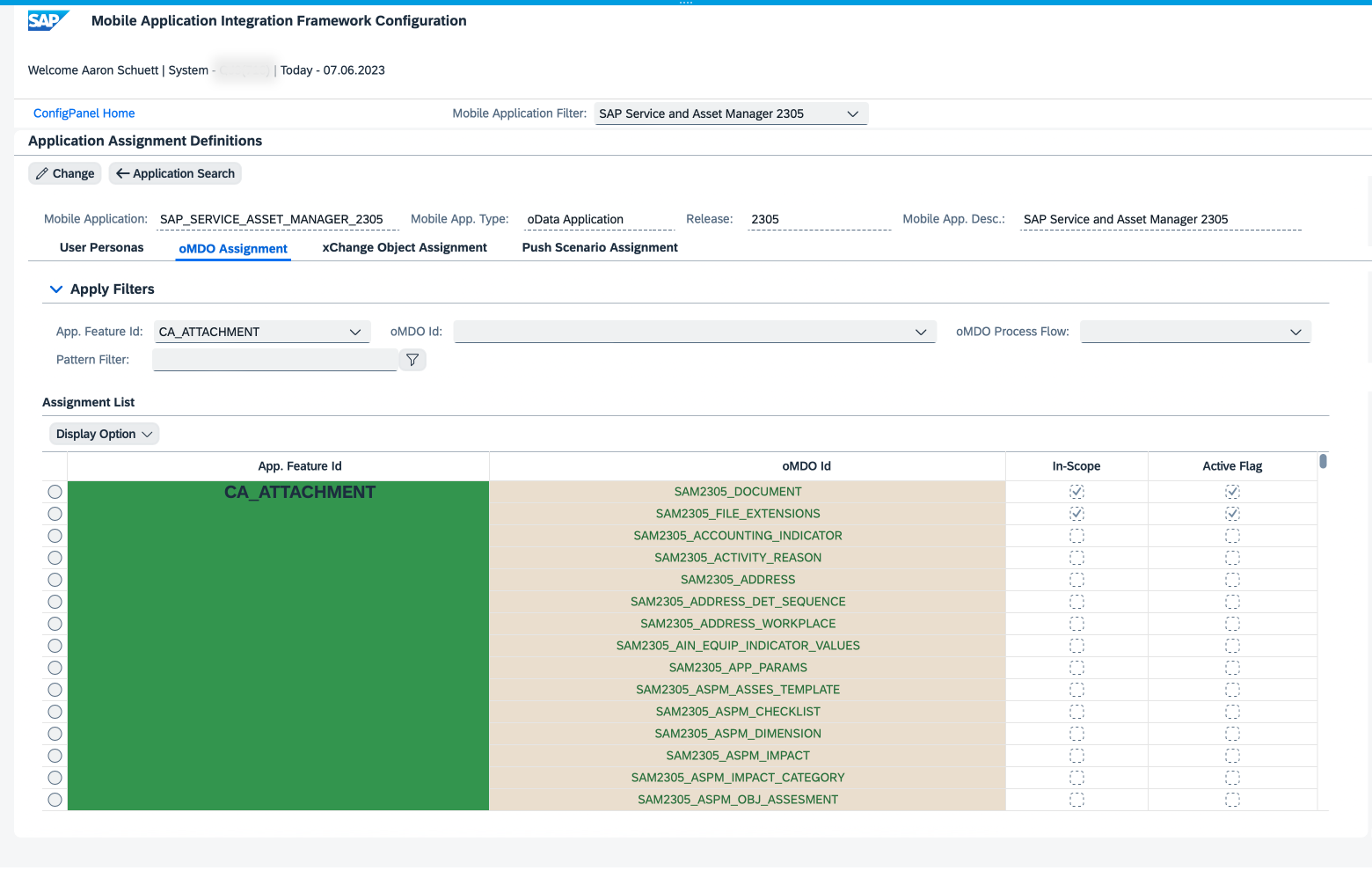
Mobile Application Integration Framework Configuration / Component Assignments / SAP_SERVICE_ASSET_MANAGER_[VERSION] / oMDO Assignment
Like feature assignments, the In-Scope checkmark indicates the data objects that are supported for each feature. Only In-Scope items can be enabled/disabled using the Active Flag checkbox, and In-scope features are not editable in customer or QA systems.
Exchange Object Assignment
Features may also be linked to an exchange object which combines technical objects, such as an exchange class handler, an exchange table, and a lock object, with configuration rules.
You may view an exchange object list in the config panel and choose which are required and disable the others.
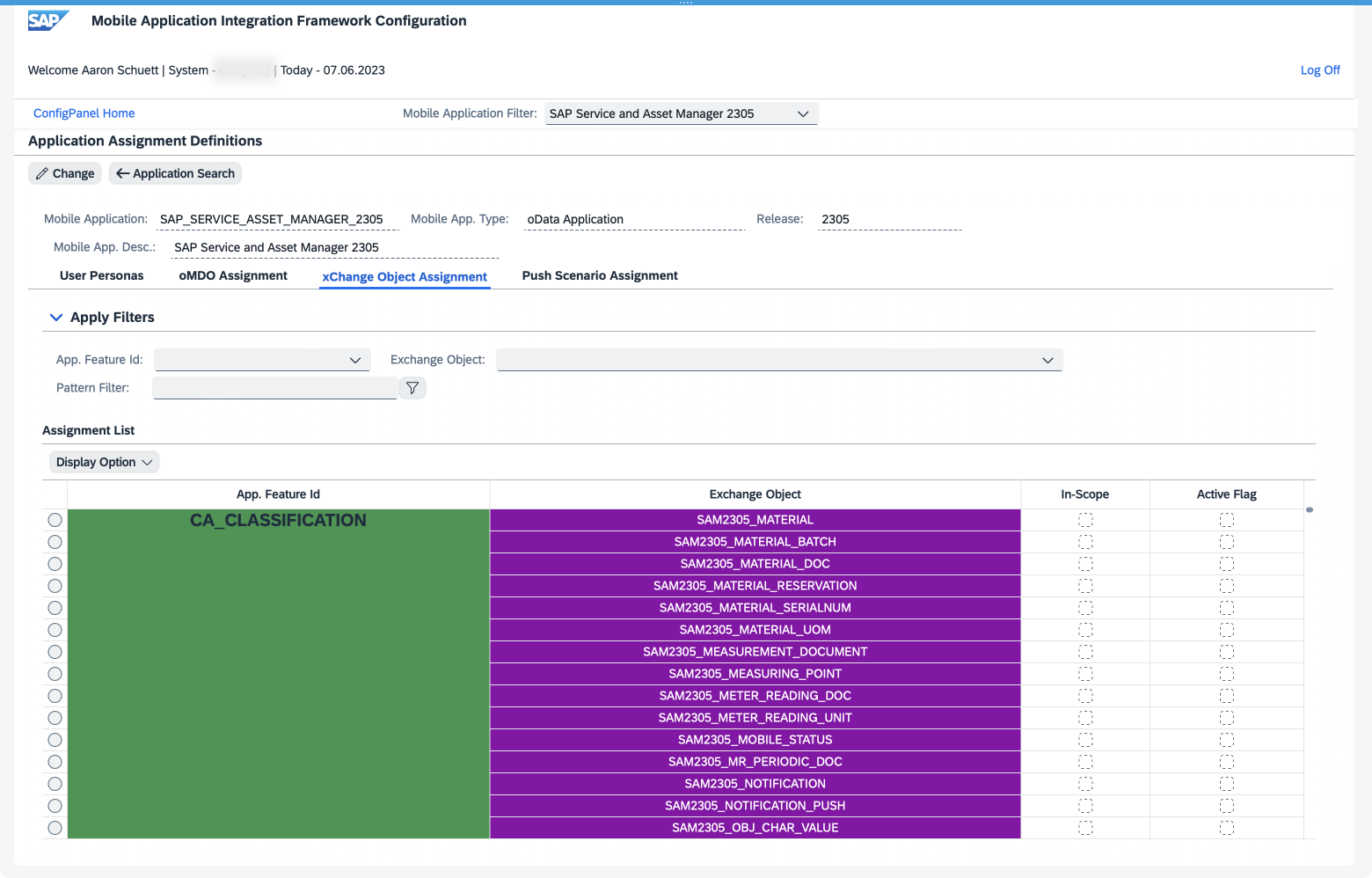
Mobile Application Integration Framework Configuration / Component Assignments / SAP_SERVICE_ASSET_MANAGER_[VERSION] / xChange Object Assignment
You may also modify the active objects individually using the exchange object configuration.
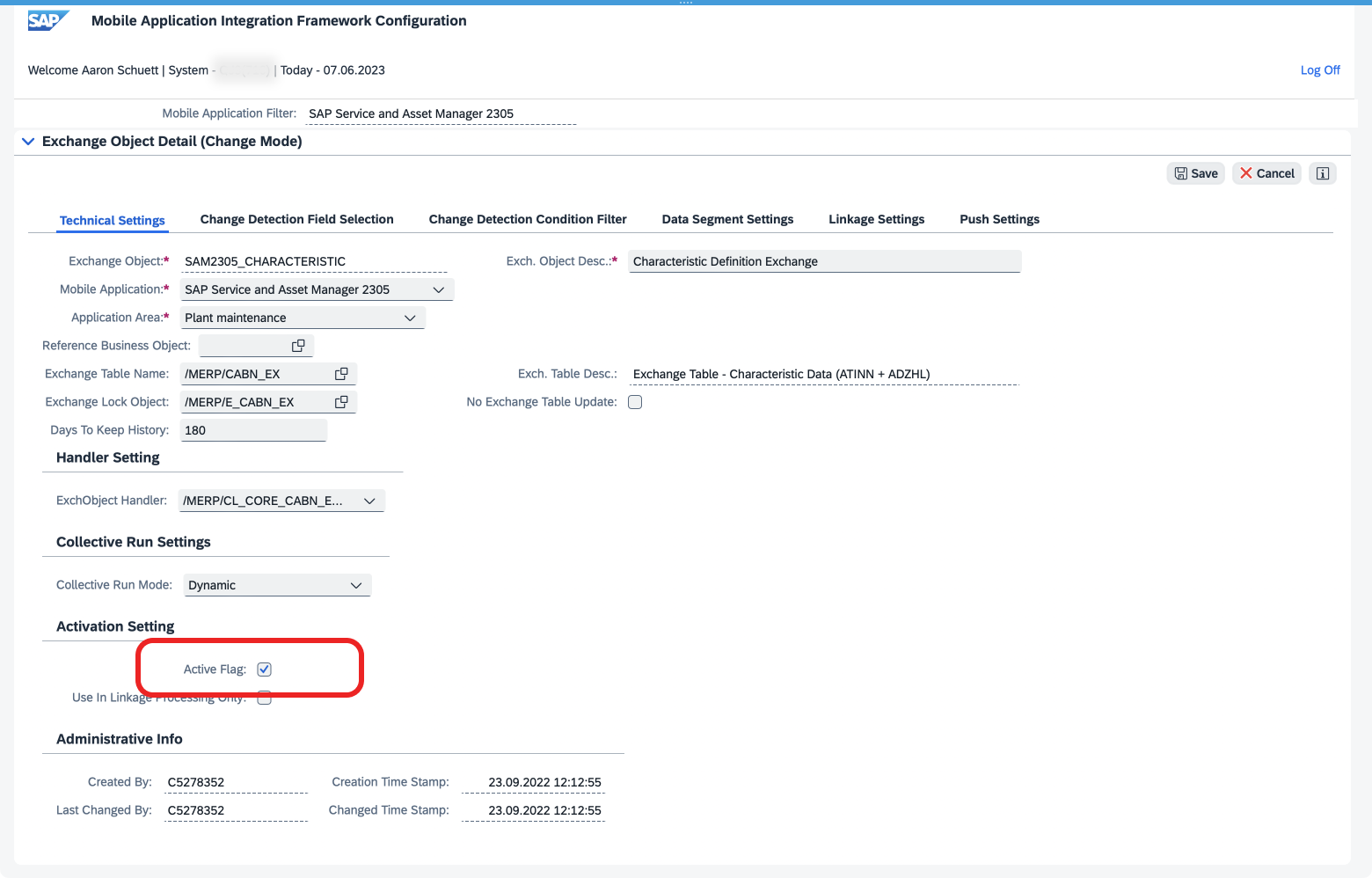
Mobile Application Integration Framework Configuration / Exchange Object Configuration / Mobile Application Filter: SAP Service and Asset Manager / Exchange Object By Application Area / Technical Settings
If the exchange object is assigned to a feature, you will see the note Activation controlled by Application Feature next to the Active flag checkbox.
This control is like the master switch, if the activation is disabled here, it will be disabled in all places regardless of the active flags set in previously covered methods. However, it is also important to note that if the object is active here, but disabled by other methods, then the related exchange will not be executed when there are changes to the object. This prevents an unnecessary exchange being triggered if feature is not applicable for the customers.
Fine-tuned calibration
Lastly, there are a few objects in configuration panel where we support activation by feature. This allows you to go further down the hierarchy to control entities, dependency objects, and such.
oData Model Entity Type
You can specify a particular entity to be enabled only if the assigned feature is activated. In the example below, the
EAMChecklistLink entity set is applicable to the Enterprise Asset Management (EAM) checklist functionality. Here only when EAM_CHECKLIST feature is enabled, EAMChecklistLink is available for the client.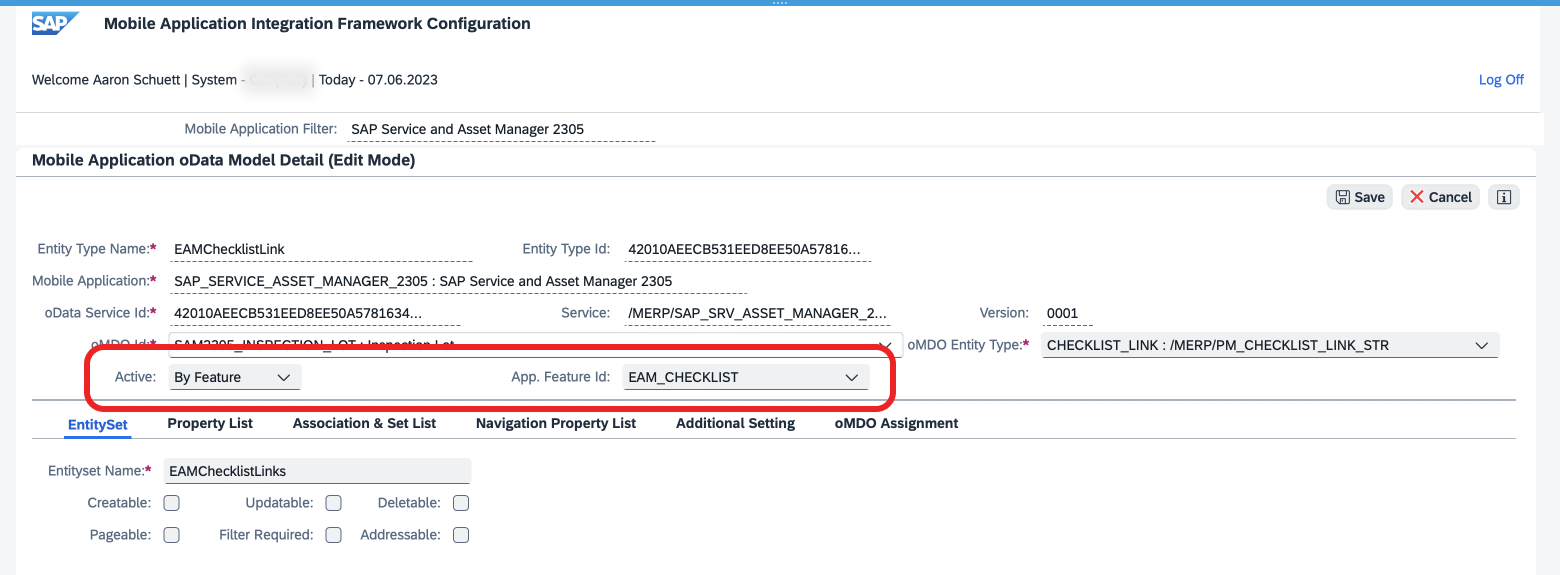
Mobile Application Integration Framework Configuration / oData Model Configuration / Mobile Application Filter: SAP Service and Asset Manager [VERSION] / oData Model Entity Type List: SAP_SERVICE_AND_ASSET_MANAGER_[VERSION] / (Entity Type) / EntitySet
Association and navigation
Like an entity type, association and navigation can be assigned to a feature. Only when the assigned feature is enabled, the association is then available to mobile client.
If the disabled flag is active, the object would not be visible to the mobile client regardless of whether the feature is enabled or not.

Mobile Application Integration Framework Configuration / oData Model Configuration / Mobile Application Filter: SAP Service and Asset Manager [VERSION] / oData Model Entity Type List: SAP_SERVICE_AND_ASSET_MANAGER_[VERSION] / (Entity Type) / Association and Set List
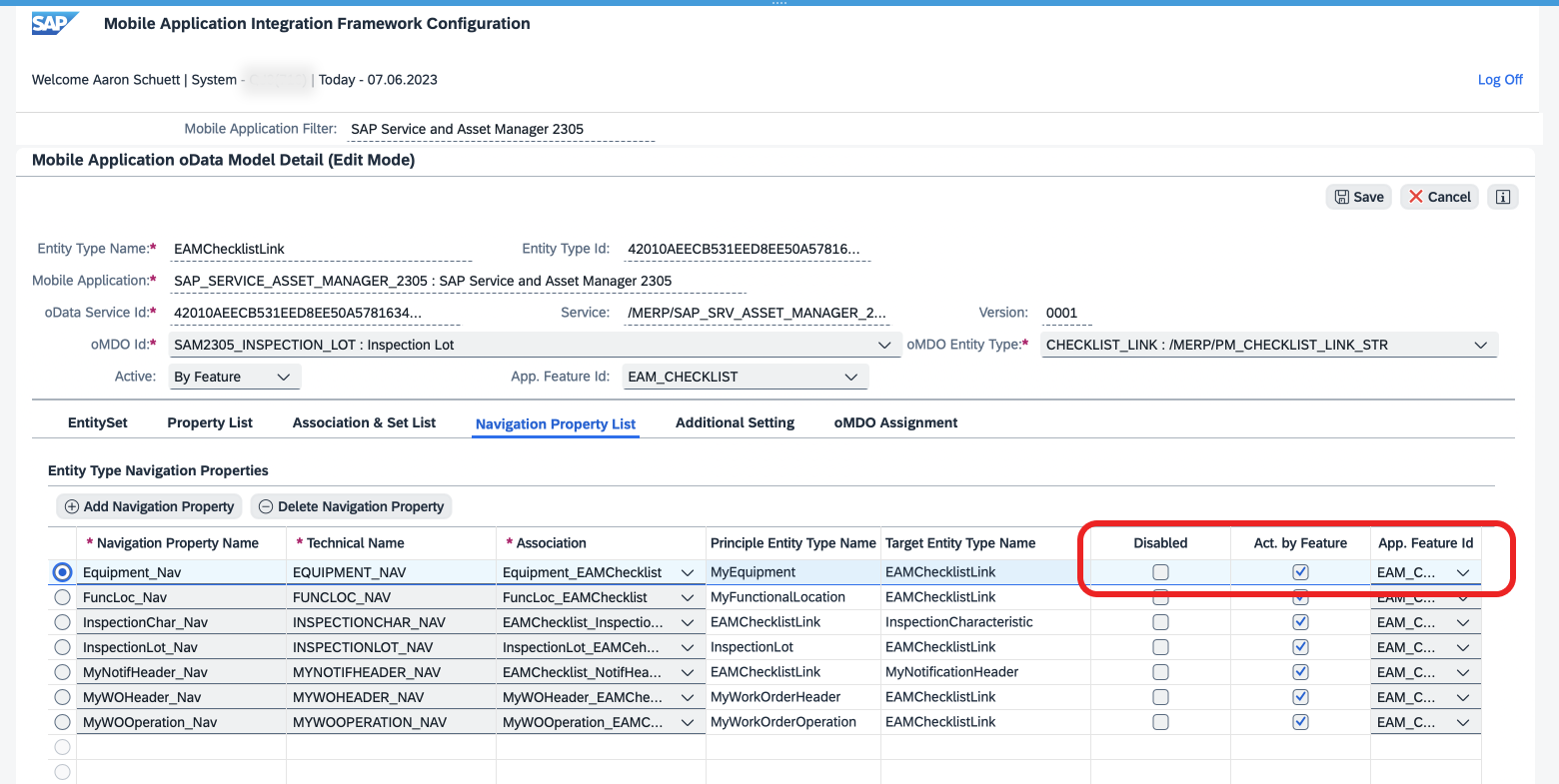
Mobile Application Integration Framework Configuration / oData Model Configuration / Mobile Application Filter: SAP Service and Asset Manager [VERSION] / oData Model Entity Type List: SAP_SERVICE_AND_ASSET_MANAGER_[VERSION] / (Entity Type) / Navigation Property List
Dependency Object
If activation by feature is configured in a dependent object, and if the assigned feature is not enabled, dependency objects will not be generated in dependency queue.
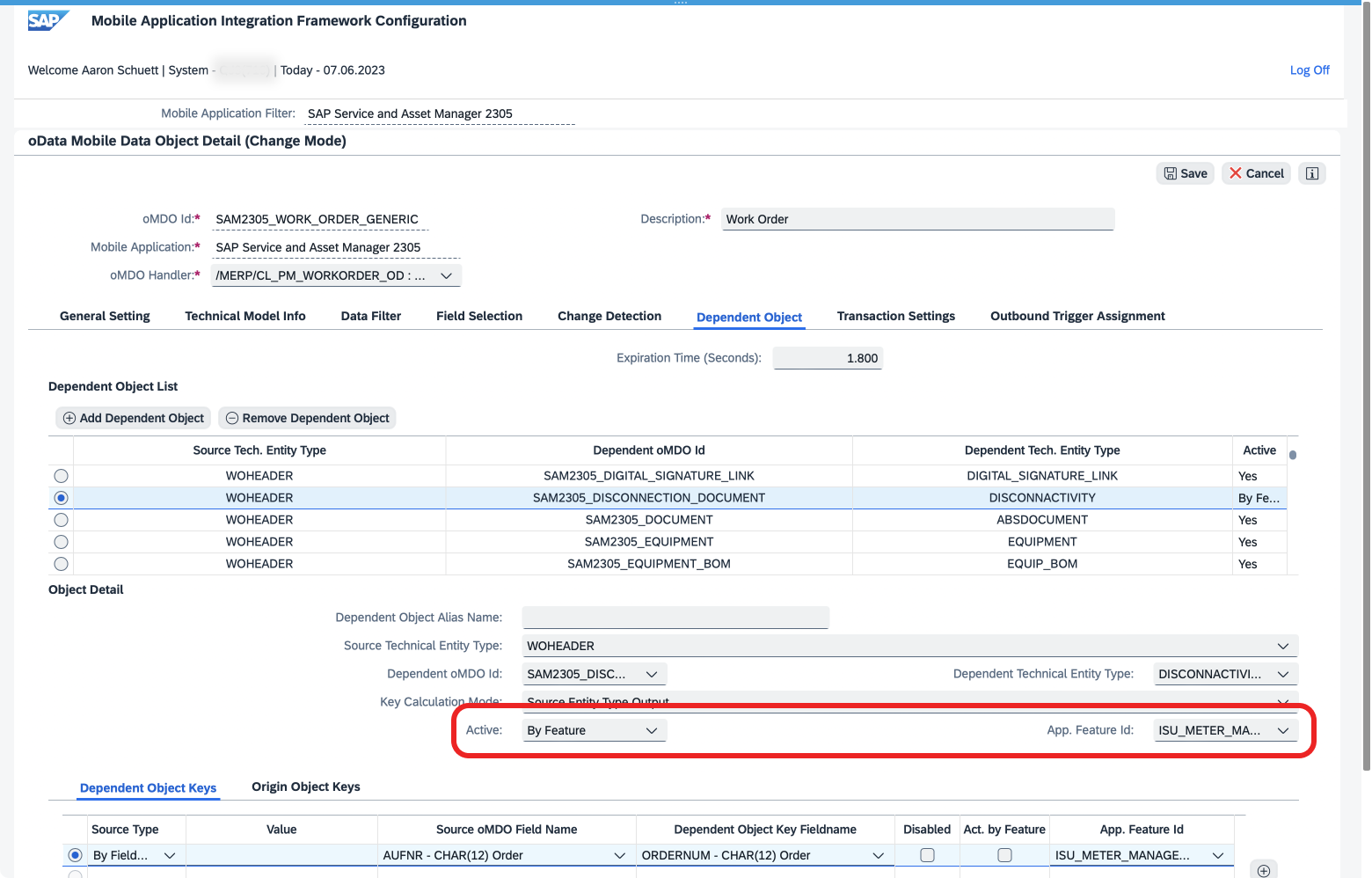
Mobile Application Integration Framework Configuration / oData Mobile Data Object Configuration / Mobile Application Filter: SAP Service and Asset Manager [VERSION] / oData Mobile Data Object List: SAP_SERVICE_AND_ASSET_MANAGER_[VERSION] / (oData Mobile Data Object) / Dependent Object
EFI configuration
An Enhancement Framework Implementation (EFI) event handler can be assigned to a feature with active flag set to By Feature.

Mobile Application Integration Framework Configuration / EFI Assignment / Mobile Application Filter: SAP Service and Asset Manager [VERSION] / Enhancement Implementation Includes: SAP_SERVICE_AND_ASSET_MANAGER_[VERSION] / (EFI Include) / Assignment
Note, there is a limitation here as we only support one feature assignment per object (e.g., entity type, association, navigation, EFI). Therefore, you cannot assign multiple features to the object in configuration panel.
Additional details
Entity Types
The following entity types are introduced in SAP Service and Asset Manager 2205 to return persona- and feature-related configurations to the mobile client. The client logic looks at these entity types to check the user personas assignment(s) and to check if features are enabled. This is used on the mobile client application to determine which user interface elements should be displayed on certain screens and sections.
UserFeature
In the
/MERP/SAP_ONLINE_LOOKUP_EXT_ service, this entity returns a list of features that are applicable based on user persona(s). With the support of UserFeature, enabled parameters are no longer defined in AppParameters.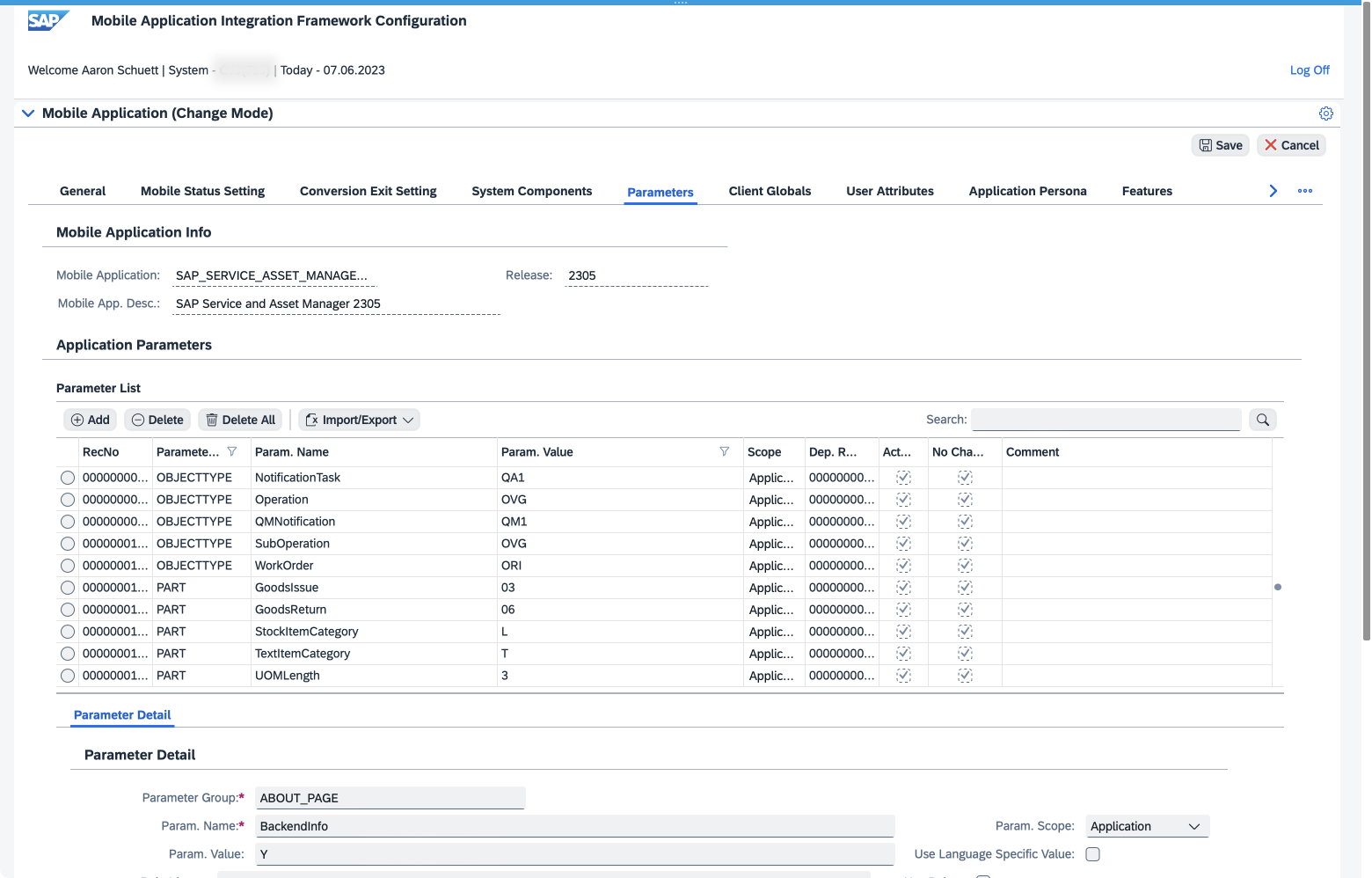
Mobile Application Integration Framework Configuration / Mobile Application Configuration / SAP_SERVICE_AND_ASSET_MANAGER_[VERSION] / Parameters
UserPersona
In the
MERP/SAP_ONLINE_LOOKUP_EXT_ service and /MERP/SAP_SRV_ASSET_MANAGER_[VERSION] service, this entity returns user persona assignment.UserSyncGroupDetail
In the
/MERP/SAP_ONLINE_LOOKUP_EXT_ service, this entity returns list of entity sets that are applicable based on user persona(s).Feature persona matrix
You may refer to this table to see which features in the standard delivery are in-scope for each persona and see their default settings.
| Feature | Maintenance Technician | Service Technician | Inventory Clerk | Safety Technician | ||||
| In-Scope | Default-Enabled | In-Scope | Default-Enabled | In-Scope | Default-Enabled | In-Scope | Default-Enabled | |
CA_ATTACHMENTAttachment support on business objects (DMS/BDS/GOS) | Y | Y | Y | Y | N | Y | Y | |
CA_AUTO_SYNCAuto-sync capabilities | Y | N | Y | N | Y | N | N | |
CA_BILL_OF_MATERIALBill of Material for technical objects | Y | N | N | N | N | |||
CA_BUSINESS_PARTNERBusiness partner details | Y | N | Y | Y | N | Y | Y | |
CA_CLASSIFICATIONClassification and characteristics for technical objects | Y | Y | N | N | N | |||
CA_CORE_DATACore data including org structure, such as Plant, Work Center etc. | Y | Y | Y | Y | Y | Y | Y | Y |
CA_CREATE_TECH_OBJECTCreate equipment and functional location | Y | Y | N | N | N | |||
CA_CREW_MANAGEMENTCrew management | Y | N | N | N | N | |||
CA_DIGITAL_SIGNATUREDigital signature for S/4 | Y | N | N | N | N | |||
CA_GEOSPATIAL_INFO_SERVICEGIS support for ESRI ArcGIS and GEF | Y | Y | Y | Y | N | Y | Y | |
CA_GIS_ADD_EDITCreate/update of geospatial data | Y | Y | N | N | N | |||
CA_LOCATION_UPDATEUser location tracking | Y | N | Y | N | N | N | ||
CA_NO_HISTORYNotification history | Y | Y | Y | N | N | Y | Y | |
CA_SERVICE_REPORTPDF service report generation | Y | N | Y | Y | N | N | ||
CA_SIGNATURE_CAPTURESignature (physical) capture as image | Y | N | Y | Y | N | N | ||
CA_TECH_OBJECTEquipment and Functional Location master data | Y | Y | Y | Y | N | N | ||
CA_WO_HISTORYWork Order history | Y | Y | Y | N | N | N | ||
CS_EXPENSE_REPORTExpense reporting | Y | N | Y | Y | N | N | ||
CS_MILEAGE_REPORTMileage reporting | Y | N | Y | Y | N | N | ||
CS_NOTIFICATIONService Notifications | N | Y | Y | N | N | |||
CS_SERVICE_ORDERService Orders | N | Y | Y | N | N | |||
EAM_CHECKLISTS/4 EAM checklist | Y | N | N | N | N | |||
EAM_EVENT_PRIORITY_MATRIXEvent prioritization for notifications | Y | Y | N | N | N | |||
EAM_MINOR_EMERGENCY_WORKEmergency work for phase model | Y | Y | N | N | N | |||
EAM_PHASE_MODELPhase model | Y | N | N | N | N | |||
EAM_PHASE_CONTROLPhase control codes | Y | Y | Y | Y | N | N | ||
EPD_VISUALIZATIONProduct Model Viewer integration | Y | Y | Y | Y | N | N | ||
FOW_ROUTEField Operations Worker capabilities | Y | N | N | N | N | |||
FSM_SCHED_INTEGRATIONFSM Scheduler integration | Y | N | Y | N | N | N | ||
HR_TIMESHEETCATs timesheet | Y | N | N | N | N | |||
IAM_CHECKLISTASPM Checklist | Y | N | N | N | N | |||
IAM_INDICATORSPdMS indicators | Y | N | N | N | N | |||
IM_CORE_DATAInventory Management core data | N | N | N | N | Y | Y | N | |
ISU_METER_MANAGEMENTMeter Management capabilities | Y | N | N | N | N | |||
MM_GOODS_ISSUEGoods issue for inventory management | N | N | Y | Y | N | |||
MM_GOODS_RECEIPTGoods receipt for inventory management | N | N | Y | Y | N | |||
MM_MATERIAL_DATAMaterial master data | Y | Y | Y | Y | Y | Y | N | |
MM_PHYSICAL_INVENTORYPhysical Inventory capabilities | N | N | Y | Y | N | |||
MM_PRODUCTION_ORDERProduct orders for inventory management | N | N | Y | Y | N | |||
MM_PURCHASE_REQUISTIONPurchase requisition for inventory management | N | N | Y | Y | N | |||
MM_STOCK_LOOKUPStock lookup by plant and storage location | Y | Y | Y | Y | Y | Y | N | |
MM_STOCK_TRANSFERStock Transfer | N | N | Y | Y | N | |||
MM_TECHNICIAN_GOODS_ISSUEGoods issue for planned materials on work order | Y | Y | Y | Y | N | N | ||
MM_VEHICLE_STOCKVehicle Stock capabilities | Y | N | Y | Y | N | N | ||
PM_ASSEMBLYEquipment Assembly information for work order | Y | Y | N | N | N | |||
PM_CLOCK_IN_CLOCK_OUTClock in/Clock out capabilities | Y | N | N | N | N | |||
PM_CONFIRMATIONPM Confirmations for time recording | Y | Y | Y | Y | N | N | ||
PM_INSTALL_DISMANTLEEquipment install and dismantle | Y | Y | N | N | N | |||
PM_LINEAR_ASSET_MANAGMENTLinear Asset Management | Y | N | N | N | N | |||
PM_MEASUREMENTMeasurement readings | Y | Y | N | N | N | |||
PM_NOTIFICATIONPM Notifications | Y | Y | N | N | Y | Y | ||
PM_OBJECT_LISTObject Lists on work orders | Y | Y | N | N | N | |||
PM_PRTProduction, Resources and Tools | Y | Y | N | N | N | |||
PM_SUPERVISOR_MODESupervisor mode | Y | N | N | N | N | |||
PM_WORK_ORDERPM Work Orders | Y | Y | N | N | N | |||
QM_CALIBRATIONCalibration Orders and Inspection Lots | Y | N | N | N | N | |||
S4_SERVICE_INTEGRATIONS/4 Service orders | Y | N | Y | N | N | N | ||
WCM_ORDERWork Clearance order | Y | N | N | N | Y | Y | ||
WCM_SAFETY_CERTIFICATEWork Clearance Safety certificate | Y | N | N | N | Y | Y | ||
WCM_WORK_PERMITWork Clearance Work permit | Y | N | N | N | Y | Y | ||
Wrap up
I hope you have found this to be a useful guide for configuring personas and features in SAP Service and Asset Manager. We welcome your comments and feedback.
You must be a registered user to add a comment. If you've already registered, sign in. Otherwise, register and sign in.
-
Artificial Intelligence (AI)
1 -
Business Trends
363 -
Business Trends
20 -
Customer COE Basics and Fundamentals
1 -
Digital Transformation with Cloud ERP (DT)
1 -
Event Information
461 -
Event Information
23 -
Expert Insights
114 -
Expert Insights
150 -
General
1 -
Governance and Organization
1 -
Introduction
1 -
Life at SAP
415 -
Life at SAP
2 -
Product Updates
4,687 -
Product Updates
202 -
Roadmap and Strategy
1 -
Technology Updates
1,502 -
Technology Updates
85
- SAP S/4HANA Cloud Extensions with SAP Build Best Practices: An Expert Roundtable in Enterprise Resource Planning Blogs by SAP
- Readiness for Universal Parallel Accounting in Enterprise Resource Planning Blogs by SAP
- SAP Enterprise Support Academy Newsletter March 2024 in Enterprise Resource Planning Blogs by SAP
- Switching to Spaces and Pages Experience Sharing - Deploying Spaces and Pages Best Practices in Enterprise Resource Planning Blogs by SAP
- eDocument Colombia Cloud Initial Configuration in Enterprise Resource Planning Blogs by SAP
| User | Count |
|---|---|
| 5 | |
| 5 | |
| 4 | |
| 4 | |
| 3 | |
| 3 | |
| 3 | |
| 3 | |
| 3 | |
| 2 |